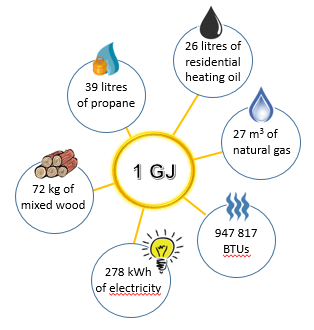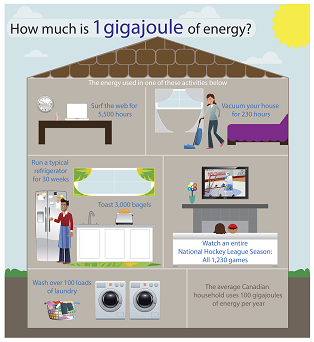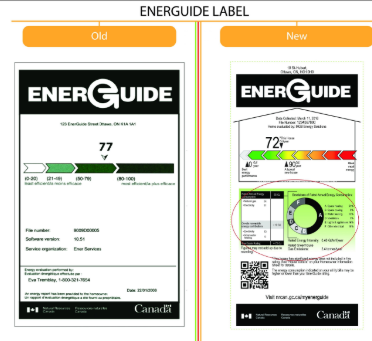

EnerGuide Rating
Rénoclimat energy advisors now use a new scale to determine a home’s energy efficiency rating.
The previous EnerGuide rating scale ranged from 0 to 100 and served as an indicator of a home’s energy efficiency. It was replaced in 2019 by a gigajoules-per-year (GJ/year) rating scale, which is based on the home’s annual energy consumption.
This new annual consumption scale is given in energy consumption units that are similar to a consumption rating of kilowatt hours per year for household appliances, kilometres per litre for vehicles or calories per serving for food.
Besides the new rating, more information will be available to homeowners via a new EnerGuide label and new renovation upgrade report, in addition to a homeowner information sheet that will be provided with each energy evaluation.
Learn more about the EnerGuide Rating System upgrades by visiting the Natural Resources Canada website.
The EnerGuide rating is a nationwide standardized energy performance evaluation tool managed by Natural Resources Canada. The system has evolved in light of the latest energy-efficient construction and renovation practices and many improvements have been made to it.
The EnerGuide home rating of Rénoclimat participants appears in their personalized evaluation report and on the EnerGuide label. The label can be affixed to the home’s electrical panel for future reference.
Energy-efficient upgrades normally help improve the EnerGuide rating, which means:
- savings on energy bills;
- improved home comfort;
- environmental impact reduction.
A gigajoule (GJ) is a unit of measure for energy consumption. It can represent any energy source, such as electricity, fossil fuels or wood.
One gigajoule is equivalent to approximately:
- 27 cubic metres of natural gas;
- 39 litres of propane;
- 26 litres of residential heating oil;
- 72 kilograms of mixed wood;
- 278 kWh of electricity;
- 947,817 British thermal units (BTUs).
Consult the infography or the texte version below.
The average Canadian household uses 100 gigajoules of energy per year. One gigajoule of energy is the energy used in one of these activities below:
- surf the web for 5,500 hours
- vaccum your house for 230 hourss
- run a typical refrigerator for 30 weeks
- toast 3,000 bagels
- watch an entire National Jockey League Season: all 1,230 games
- wash over 100 loads of laundry
Source: Natural Resources Canada
The 0-100 EnerGuide Rating System was used in the Rénoclimat program until September 30, 2019. The rating system reflected the exact measurement of a home’s energy efficiency and made it possible to compare the performance of a residence with that of other similarly sized residences built in the same area.
Homeowners who received a Rénoclimat energy evaluation before October 1, 2019, are registered under the previous EnerGuide Rating System. However, the GJ/year rating will be used for their post-retrofit evaluations or subsequent evaluations.
The table below provides examples of 0-100 EnerGuide ratings based on housing characteristics.
Interpreting the old EnerGuide rating
| EnerGuide Rating | House Characteristics |
|---|---|
0 to 50 | Older, unrenovated home |
51 to 65 | Older, renovated home |
66 to 74 | Older home with energy savings renovations or new standard home |
75 to 79 | New energy efficient home |
80 to 90 | New, high energy performance home (ex. Novoclimat house) |
91 to 100 | Home that requires little or no energy purchases |
(copie 4)
(copie 5)
Share this page





